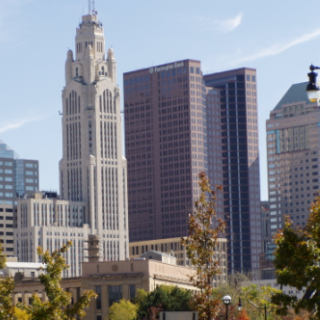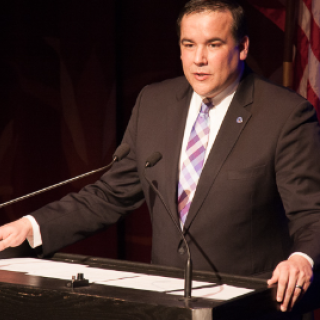Advertisement
When we think of Martin Luther King, Jr., most of us think of King the dreamer, who spoke to the more than 200,000 people amassed in front of the Lincoln Memorial on that sultry August day in 1963. We think of the man whose soaring rhetoric–some of it extemporaneous–let us in on his dream of living in an America where his four children would be judged by the content of their character rather than the color of their skin. The King of the March on Washington for Jobs and Freedom has been defined as the man who was looking to build a color blind America in which all men and women were bound together by their very humanity, and neither their race or ethnicity mattered. King is frozen in the American psyche: a deeply religious man who merely wanted to see peace on earth and good will among the races.
Ever since that famous speech, he has been co-opted by politicians and consumerism. Every year he becomes more cardboard cut out and less radical. It is as though we have a vested interest in remembering only the King who constantly turned the other cheek, exhorted blacks to love their enemies, and eschewed violence. His birthday is a federal holiday and his widow, children and associates have always encouraged people to make it a day to serve others. But just like so many other federal holidays, King’s birthday has become just another long weekend and an opportunity for retailers to capitalize on the fact that so many people have the day off and time to go shopping. Indeed last month, one national retail chain advertised a “five-day Martin Luther King, Jr. sale.”
So what I’d like to focus on is the Martin Luther King most people neither acknowledge nor know about: that is, an angry black man who admitted that he once hated white people. This is so shocking a thing to say about King that it borders on heresy. How could a man who referred to himself as “a drum major for righteousness” say that he hated white people?
King was born and reared in the rigidly segregated South, where merely being born black was enough to shorten one’s life span by years. He was the brilliant, sensitive, cosseted middle child of a middle class black family. King’s father, Reverend Martin Luther King, Sr., was a Baptist minister–he studied for the ministry after being inspired by black ministers who supported civil rights–and was head of the Atlanta chapter of the NAACP. Daddy King was well known in the black community and had even earned the grudging respect of some of Atlanta’s white citizens. He fought Jim Crow on many fronts throughout his entire life and, while he sometimes had to acquiesce to it, vowed he would never accept second class citizenship. His courageous stance on and work for equal rights for blacks made a profound impact on his son.
King also grew up in a proud black family, long before black pride became a popular movement. He was taught to be proud of his black features and especially the distinct heritage and experience that is the black church. During the summer months, Daddy King often sent the younger man to work in the fields so that he would develop a healthy respect for what previous black generations had experienced.
Middle class status, however, could not protect the younger King from the daily humiliations to which blacks in the segregated South were subjected. He was forced to give up his seat on a public bus, and he and his father left a shoe store rather than give up their seats to white customers. King was also well acquainted with the word “nigger.” He saw and understood how the brutal atmosphere of segregation left the black community frightened, dispirited and resigned to living in hell on earth. Growing up in the segregated South made King a bitter and angry young man.
Jonathan Rieder, author of “Gospel of Freedom: Martin Luther King Jr.’s Letter From a Birmingham Jail and the Struggle That Changed a Nation,” stated that King “once detested white people because of his experiences growing up in the segregated South. He went through a period of hatred toward whites, and it took him some time to get over it. He would say that when he saw Malcolm X on television–a man whom he admired–there would be times when he would feel that old bitterness rising.”
King wrote about his hatred of whites as a student at Crozer Theological Seminary. In a paper entitled “Autobiography of Religious Development,” he said “. . . I was determined to hate every white person. As I grew older and older this feeling continued to grow. . .and I did not conquer this anti-white feeling until I entered college.”
Americans invested in the notion of a color blind society have forgotten what 1963 was really like. The country was two years into the presidential administration of John F. Kennedy, who at first saw racial injustice as a matter that interfered with his goals for America and embarrassed the country abroad. But 1963 was a pivotal year for the civil rights movement. Students from Morgan State and Howard Universities, historically black colleges, demonstrated against the segregated Northwood Theater, filling the local jails. The city of Cambridge, Maryland was placed under martial law for months after demonstrations by the Cambridge Non-Violent Action Committee attracted mob violence. Dozens of cities across the south were the target of sit-ins, pray-ins, marches and the like in support of desegregating public accommodations.
Nine years earlier the U. S. Supreme Court outlawed segregation in public schools in the case of Brown v. Board of Education of Topeka, Kansas (1954). Yet in 1963 fewer than five percent of public schools in the south had been integrated.
It was also the year of the Children’s Crusade in Birmingham, Alabama; the murder of white letter carrier William Moore, who embarked on a walk across the state of Mississippi in support of equal rights for blacks; George Wallace’s stand in the schoolhouse door at the University of Alabama; JFK’s civil rights address and the assassination of NAACP official Medgar Evers.
All of these things brought King to the moment he gave that wonderful speech. And Americans breathed a sigh of relief because the day of the March on Washington was so beautiful and violence free. When leaders of the March met with President Kennedy at the White House, he greeted them by saying “I have a dream.” (So impressed was JFK by King’s speech, he borrowed the rhetorical device of the repetitive line for his Ich bin ein Berliner speech.)
The nation’s deliberate focus on the last part of King’s speech has allowed it to forget the angry black man who addressed the crowd that day. At the beginning of his speech, King sharply scolded the nation for its abandonment of her African American citizens after the Emancipation Proclamation, the Civil War and Reconstruction. Instead of exalting the Framers, he called them out, accusing them of defaulting on the promises in the Declaration of Independence and the Constitution. King reminded the record breaking crowd that America had repeatedly and willfully presented her black citizens with checks she knew could not be redeemed.
King also reminded America that black people were tired of injustice, cowardice and the lack of will among its elected officials. He no doubt unsettled many people when he said “Those who hope that the Negro needed to blow off steam and will now be content will have a rude awakening if the nation returns to business as usual. There will be neither rest nor tranquility in American until the Negro is granted his citizenship rights.”
The man who penned those words was clearly not a naive dreamer hoping to create a color blind society, nor was he a plaster saint whose birthday we celebrate in part by attending breakfasts. The man we fail to remember from the March on Washington for Jobs and Freedom was a proud and angry black man, and what Jonathan Rieder called a “furious truth teller.” In taking on a deeply racist, unfair society, what else could he possibly be?
Americans should be big enough to embrace King in his totality. It is a more honest and fitting tribute to a man who gave up his life for freedom, opportunity and equality. We owe him no less.


